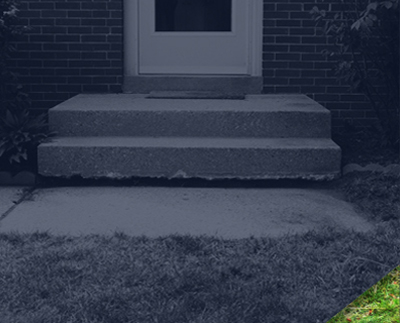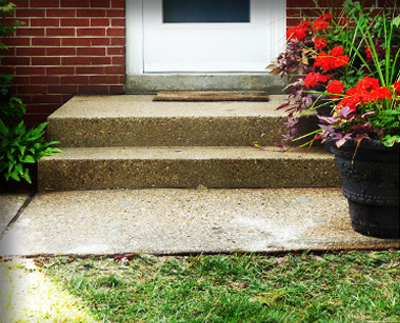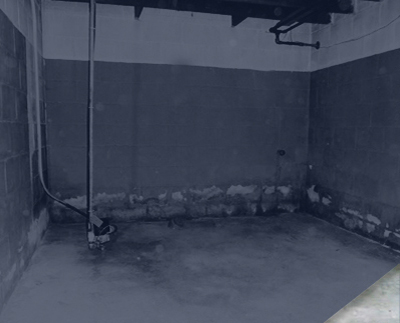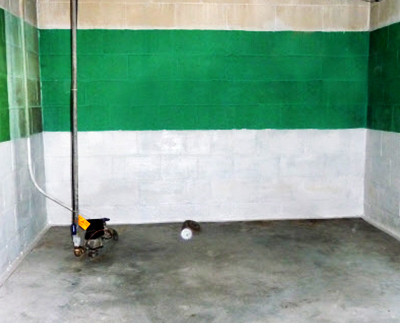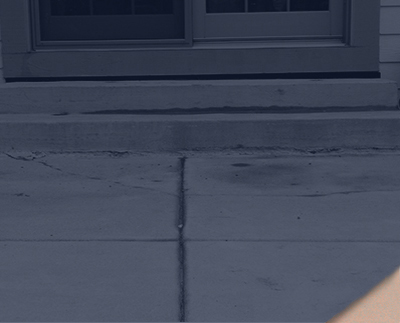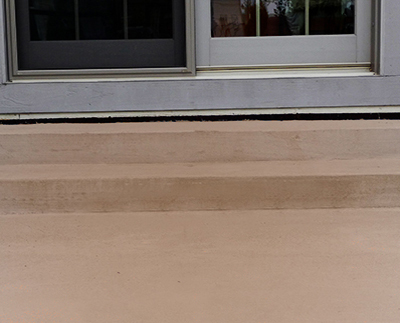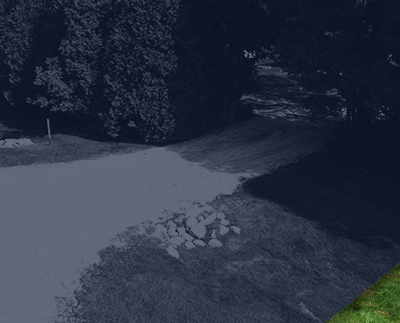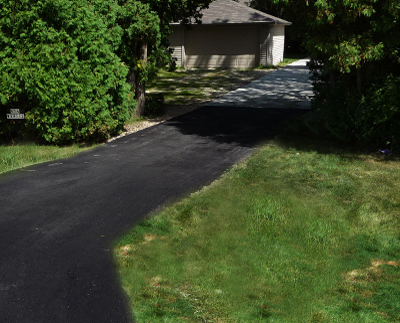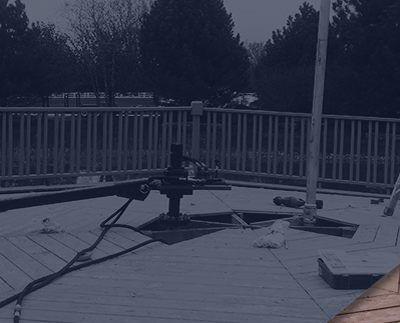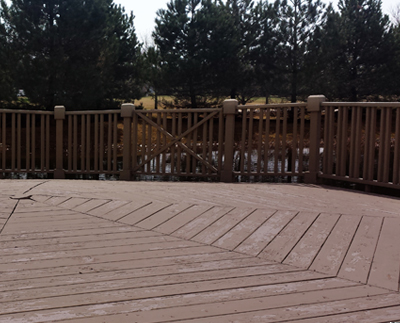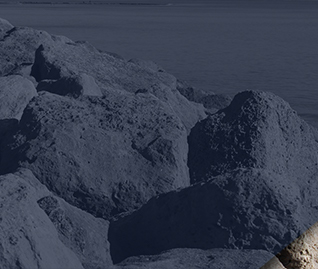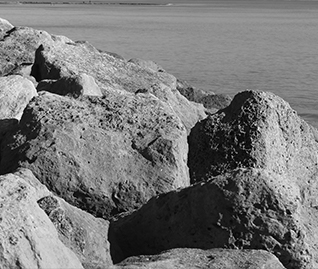What is mudjacking?
Mudjacking levels all types of concrete from driveways and sidewalks to warehouse floors and staircases by filling voids underneath the concrete with cement mix.
What advice do you have for a customer looking to hire a mudjacking service provider like you?
#1: Never, under any circumstances, pay for an estimate.
#2: Never hire someone who comes rolling down the street in an obvious work vehicle without a company name on the side of it. Also look for the DOT number, state, city, phone number, web address, license plate, etc.
#3: Do some research on a company before hiring them. Are they based out of a different state, a thousand miles away, just doing work for the summer months? What if something goes wrong? It's very tough to have a company return to fix something if they are based far out of state.
If you were a customer, what do you wish you knew about concrete repair services? Any inside secrets to share?
Some companies see the customer as a helpless wallet, just waiting to have cash removed.
Whatever problem you're having, whether it be concrete, asphalt, roof, or tree related: use the internet, pick up a book, or talk to people at a hardware store for advice. Get educated on the repair methods used today for the problem you are experiencing. How else are you going to know if someone is selling snake oil?
Why does your work stand out from others who offer mudjacking, concrete repair, and seal coating ?
Simple:
I (Clint) used to work for two different companies that only cared about how quick we could get a job done. We were told to "speed things up," instead of "make quality." When a business only cares about its own profit and forces employees to rush through jobs, the customer never wins. MUDTeCH™ feels it's about time somebody stepped up to the plate and offered quality work at competitive prices.
About how much does it cost for mudjacking, concrete repair or seal coating?
Some jobs are similar, but no 2 are exactly the same.
MUDTeCH™ uses a pricing system that starts with an inspection of the problem by an experienced estimator. Once all the problems have been identified, we can determine the best way to fix them and quote you a price. We do not use high pressure sales tactics or have hidden charges. Everything is discussed up front.
What is basement waterproofing?
Basement waterproofing is a way to prevent water from entering your basement. MUDTeCH™ uses a variety of approaches, including installation of tile drains and French drains, to keep water from entering your basement through the walls and the ground.
Why does my basement need to be waterproofed?
Waterproofing your basement is necessary to keep your basement from flooding and your possessions from being ruined. Additionally, damp basements can cause health problems from mold growth. Call MUDTeCH™ at 262-337-0934 for more information about why basement waterproofing is so crucial for your home, or click the Contact Us link to request an estimate.
What do wet walls in my basement indicate?
Wet walls are a common indicator of an improperly waterproofed foundation or cracks in the foundation. Wet walls are an early warning sign of bigger problems if left untreated. You could experience serious damage to your interior from mold growth, and you're also at risk of flooding. The basement waterproofing experts of MUDTeCH™ can determine the exact cause of the wet walls in your basement and recommend the best solution.
My home is relatively new – how can I have water in my basement?
Unfortunately, many homeowners are finding their home’s foundation was never properly waterproofed. This is because many home builders use a method called “damp proofing.” The goal of damp proofing is to keep out soil moisture, but not other moisture and water. The water in your basement is most likely from rainfall or snow thaw, which is making its way into your home from the lack of a waterproofed basement foundation. MUDTeCH™ can detect the exact cause of water in your basement and recommend the best solution.
Why can’t I waterproof my own basement?
There are many things that can cause wet or damp basements. Some, like missing downspouts, can be fixed by the homeowner. Often, though, to properly waterproof a basement a full excavation around the building or a section of the building is necessary. This is not a simple do-it-yourself task and extreme damage can be done if the work isn't done properly. For a long lasting solution to your basement waterproofing concerns, call the experts of MUDTeCH™.
How effective is basement waterproofing?
The type of basement waterproofing MUDTech does is the most effective action you can take to prevent your basement from flooding and your possessions being ruined by water and mold. Call MUDTeCH™ today for the most effective basement waterproofing services in Milwaukee and surrounding areas.
How long will basement waterproofing last?
When done correctly by a professional basement waterproofing company like MUDTeCH™, basement waterproofing should last upwards of 10 years. Depending on the extent of the work done, some basement waterproofing solutions can last decades. To learn more, and to request an assessment of your basement, call the basement waterproofing contractors of MUDTeCH™.
What is the alternative to basement waterproofing?
Often, basements get wet from improper drainage of water surrounding the building. Creating French Drains, drainage trenches or just rerouting the water through drains away from the building can help remove excess water from your home before it causes damage. In some situations, concrete or asphalt can also be mudjacked or repaired to solve the problem. Contact MUDTeCH™ for more information about drainage solutions used in conjunction with basement waterproofing services.
How much does basement waterproofing cost?
The cost of basement waterproofing varies depending the issues we find and the waterproofing solution used to fix it. In some situations, mudjacking a few sidewalk slabs around your foundation or changing the grade of the asphalt or lawn around your home may solve the problem. Contact MUDTeCH™ for a quote on your basement waterproofing solution.
How do I know if I need asphalt repair?
Areas of asphalt containing a lot of cracks (commonly referred to as alligatored areas or spider cracking), can be a sign your asphalt is in dire need of repair. Potholes are essentially disintegrating pavement and should be fixed immediately to avoid further damage to the surrounding pavement and vehicles driving over your parking lot or driveway. For a quote on repairs, contact the asphalt repair experts at MUDTeCH™.
What are my asphalt repair options and how do I know which is right for me?
There are three primary types of asphalt repair: remove/replace, infrared repair, and skin patching. Remove and replace is usually the longest lasting repair and by far the most expensive. We remove the destroyed piece(s) of asphalt, oftentimes dig out and replace poor base material and replace it with fresh stone, then replace the damaged asphalt with fresh asphalt. If you have a bad base under the asphalt layer, this solution is the best asphalt repair method, and no other type of asphalt repair will be a permanent solution.
Infrared asphalt repair is the best repair choice in many situations. The damaged asphalt to be fixed is usually sunken, or pieces are missing (pothole), but the base material under the asphalt layer is still strong. So, we heat the existing asphalt around the problem and add new hot asphalt to the old hot asphalt, creating a thermal bond to the existing pavement with no possible way for water to get under the repaired area. The infrared repair is a seamless welded asphalt patch with no saw cuts for water to get in and no lips for a snow plow to catch.
Skin patching, the cheapest type of asphalt repair, usually is only a temporary solution, as the damaged asphalt is just covered with a new piece of asphalt. Skin patching can be used effectively, however, in some situations.
MUDTeCH™ will give you an honest opinion on which asphalt repair method is right for your situation and your budget. Contact us today for more information or to request a quote.
Another asphalt contractor said skin patching was the only way to fix my asphalt. Is this true?
No! Unfortunately, many asphalt contractors try to sell skin patching to everyone in need of asphalt repair. Skin patching is a quick and simple fix that doesn’t require the expensive equipment necessary for other types of asphalt repairs. Many companies that don't have the equipment try to sell skin patching to everyone in order to make a quick buck. Skin patching is just a temporary solution. The damaged asphalt underneath will eventually break through the patch, or the patch will flake away, requiring additional asphalt repair. Call the asphalt repair contractors of MUDTeCH™ to learn about all your asphalt repair options.
I need asphalt repair, but the damaged area is very large. Can Mudtech still use the infrared asphalt repair method?
Yes, in most situations! MUDTeCH™ is one of only two asphalt repair companies in Wisconsin with the larger heater (6’ x 13’) for infrared asphalt repair. Most people are very surprised by the size of areas we can repair, and at a fraction of the cost of traditional asphalt replacement. Call us today for more information.
How much does asphalt repair cost?
Every asphalt repair job is different, so we cannot give a price until we’ve evaluated the problem. Please contact our asphalt repair team at 262-337-0934, or click the Contact Us tab to schedule an inspection.
Why should I use mudjacking to fix my sunken concrete instead of replacing the concrete slab?
If your concrete slab is still in decent shape, mudjacking your sunken concrete slab is a viable option. It is much cheaper than replacing it altogether. Mudjacking is also a faster, cleaner, more environmentally friendly process and is still a permanent fix for sunken concrete problems.
What causes concrete to sink and require mudjacking?
The dirt, gravel, and backfill underneath your concrete will all settle over time. This will create a void, which leads to sinking. Concrete slabs on a slope are more susceptible to sinking, as the soil underneath is prone to wash away in rainstorms. The type of soil is also a factor. Areas with a lot of clay as the base usually suffer the most, but sand and gravel type soils can also settle or wash away. Additionally, excess weight on the concrete such as large vehicles or piles of landscaping material can quicken the settling process. Animals tunneling underneath the concrete are another cause of sinking concrete. Mudjacking allows us to return your sunken concrete to its original height by pumping a new base material made of sand and cement under your slabs, and slowly returning the sunken concrete to its original position – or as close to original as needed.
How much does mudjacking cost?
Mudjacking is very reasonable in cost compared to full concrete replacement, or a lawsuit because somebody tripped. Contact mudjacking experts at MudTech today for a free quote on our mudjacking services. Mudjacking not costs less than tearing out and repouring concrete, but it is also a far less time consuming process.
How long does mudjacking last ?
If done by a reputable mudjacking company, your newly raised concrete slabs will stay level for many years to come. However, it is also important to ensure all potential drainage issues are solved. Eliminating the original causes of the sinking concrete will help prevent it from happening again.
Here are some tips to ensure your mudjacked concrete remains in place:
- Fix gutter down spouts to drain away from the concrete, and adjust the location of any sprinkler heads. If your lawn isn't properly graded, have it done.
- Back fill along the edges of your slabs – if you can clearly see the bottom of the slab, it needs more back fill. A good rule to follow is to keep the back fill 3/4" to 7/8" up on the side of the slab. This will help prevent erosion.
- Do your part to keep rodents such as chipmunks and ground squirrels away from your concrete. MUDTeCH™ offers a special organic rodent mix upon request.
What forms of concrete can be mudjacked by your team?
Almost all concrete can be mudjacked:
• Driveways
• Sidewalks
• Curbs
• Steps
• Patios
• Garage Floors
• Basement Floors
• Parking Lots
• Streets
• Pathways
• Pool Decks
• Trails
• Voids filled (grouted)
For questions about mudjacking a particular piece of concrete, please give our mudjacking team a call at 262-337-0934.
Why should I consider seal coating?
Seal coating will extend the life of your pavement by protecting it from harsh weather elements, chemicals such as oil and gasoline, and oxidation from sunlight. Regular seal coating maintenance will extend the life of pavement considerably.
How often should I have seal coating done?
Asphalt should be seal coated every 2 to 4 years. In certain situations it may be wise to seal coat more often, such as pavement that has high traffic volume or exposure to unusually harsh weather conditions. Contact seal coating experts for a professional analysis of your asphalt or pavement.
When should the first seal coating application take place?
Your pavement will need to be sealed about one to two years after installation. It should not be sealed immediately after installation, as it needs time to cure and set. However, waiting longer than a year or two after installation for the first seal coating application can lead to potential damage due to chemicals or weather.
Are certain weather conditions required for seal coating to be done?
Yes – the outside temperature must be 50 degrees or above for the seal coating to cure properly. Additionally, the pavement must be completely dry for seal coating to be done, so overnight rainfalls or forecasted storms may cause your seal coating job to be rescheduled.
How long does the seal coating need to dry before I can drive on the pavement again?
Your seal coating will need a minimum of 24 hours to cure before you can drive on it again. In most cases, we recommend 48 hours.
Are there different types of asphalt sealer available, or is it all the same as the stuff at home improvement stores?
There are numerous different types of sealer and different mixtures. The sealer in a bucket from local stores is a low grade sealer designed for very light traffic and has a tendency to track into the house. MUDTeCH™ uses commercial grade sealer with polymer additives and silica sand. This sealer is designed to stand up to heavy traffic and will last for years with typical driveway traffic.
MUDTeCH™ offers different types of commercial sealer, as well. In Dane County and the Madison area, the use of coal tar sealer is not permitted, so we use an asphalt emulsion sealer instead. We offer this asphalt emulsion sealer anywhere in our work area. Asphalt emulsion is less harmful to the environment than traditional coal tar sealer, but it doesn't wear as well. Asphalt emulsion sealer replenishes the natural oils in the asphalt and does not tend to crack or flake like the sealers that come in buckets. Coal tar is the sealer of choice by most customers in Milwaukee, Waukesha and surrounding areas. Coal tar sealer wears well and will last many years when properly applied.
From Questions about Asphalt Repair to Basement Waterproofing, MUDTeCH Has Answers
Below are links to the most frequently asked questions about our services. Whether you need basement waterproofing in Madison WI or concrete repair work in Milwaukee, chances are you’ll find an answer to your question here, as well as a few tips. If not, though, don’t hesitate to contact us.





